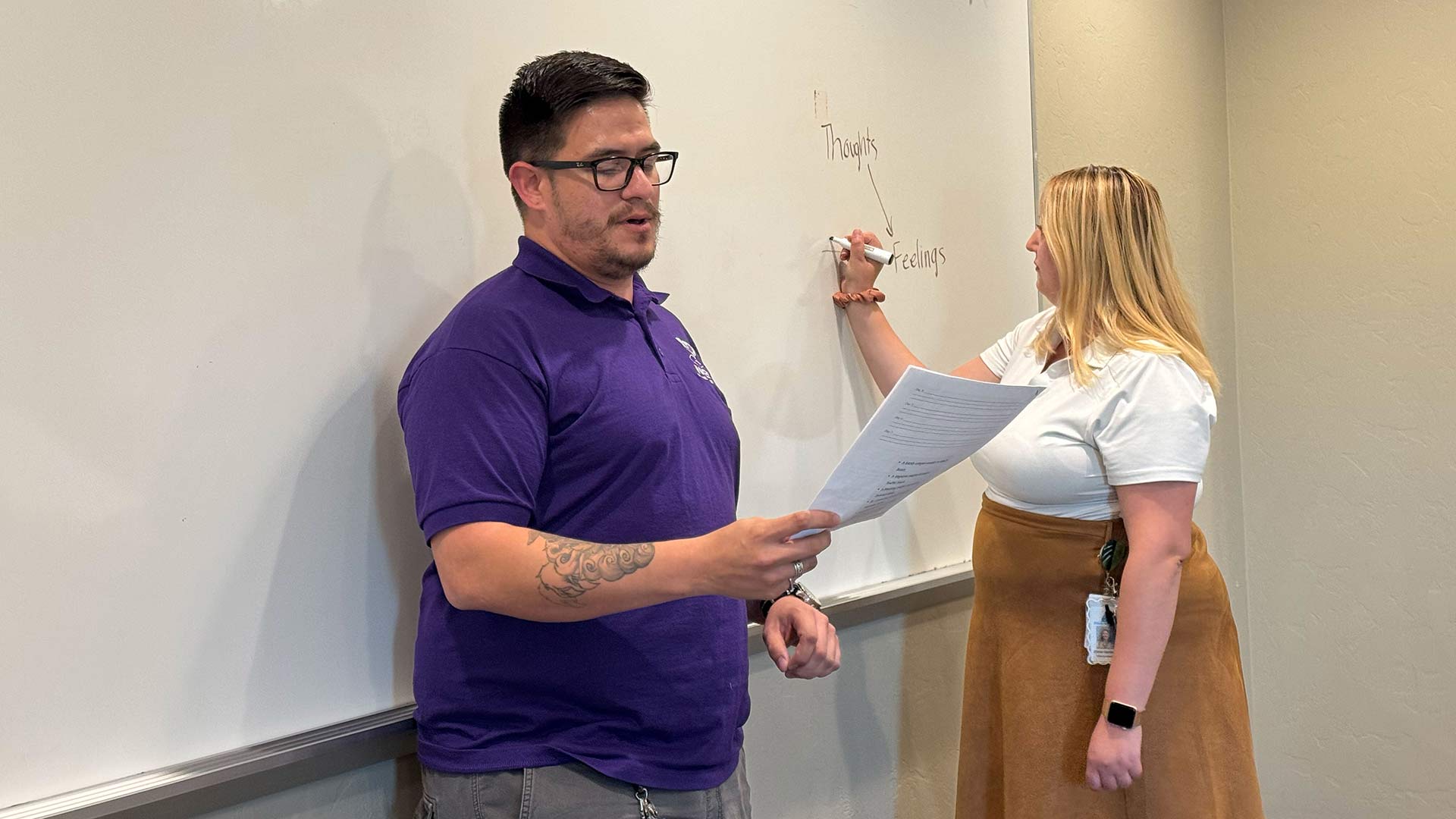 Pima County INVEST program instructors Javier Arvizu and Elena Santana teach a life skills class to individuals recently released from jail in Tucson, Ariz., on Wednesday, April 23, 2025.
Pima County INVEST program instructors Javier Arvizu and Elena Santana teach a life skills class to individuals recently released from jail in Tucson, Ariz., on Wednesday, April 23, 2025.
On a Wednesday evening at the Abrams Public Health Center in Tucson, Javier Arvizu brings down the classroom chatter with a quick “Alright guys, it’s about that time, how’s everybody doing today?”
Arvizu is kicking off a class that employees at the Pima County Detainee and Crisis Systems warmly refer to as “Adulting 101.” Officially, the class is called Freedom Management, and it’s part of a county rehabilitation program known as INVEST—short for Inmate Navigation, Enrollment Stabilization, and Treatment.
The group’s conversation ranges from setting healthy boundaries with friends, to the risks of starting a romantic relationship right out of jail, but the main topic of the evening is how participants talk to themselves.
“So for me, I try to turn that angry self-talk into something positive,” instructor Bryan Richter told the group. “Like, it might not be easy to get rid of the anger right away, but you can channel it into something like, and this may not seem very positive, but you know, I'm gonna exist out of spite.”
INVEST is a randomized control trial funded in 2019 by the U.S. Department of Justice. Selected inmates at the Pima County Jail are put through a cognitive behavioral change curriculum focused on life skills, emotional regulation, and personal responsibility, with the hopes of reducing their chances of ending back in jail.
The Freedom Management classes are a central component of the program, aimed at easing the transition to life after incarceration, but they’re also taught at the Abrams Center for those on the outside. The curriculum was designed by Manny Mejias, who developed it from his own experience in prison.
“The curriculum came from my own personal studies trying to figure out where things went wrong for me,” Mejias said. “If I need them to be vulnerable with me, then I have to be vulnerable with them.”
 VIEW LARGER Abrams Public Health Center in Tucson, Arizona.
VIEW LARGER Abrams Public Health Center in Tucson, Arizona. INVEST participants are considered high-risk, meaning they have a history of substance abuse and mental health challenges, and are statistically more likely to commit another crime. That, says Deputy Director Matt Pate, makes it especially hard for them to break the cycle.
“Each jail booking, it gets harder to get back,” Pate said. “The first time you get booked into jail, you might still have that job, you might still have that relationship. But by the time people get to the stage of INVEST, where most of our people have maximum criminogenic risk, they've lost a lot of things. And jail's not as scary as it would be for maybe you or I.”
According to county data, the first group of 300 INVEST participants saw a 31% reduction in recidivism. But Pate said the team also measured subtler indicators of success.
“If we're looking at it from recidivism, you can essentially only measure your failures,” he said. “How do you measure your successful cases? And so we tried, in this study, to get a little bit more creative in looking at things like days in community.”
On average, INVEST participants spent 10 more days in the community between jail bookings compared to non-participants. Those who attended 20 or more Freedom Management classes were more likely to stay out of jail; nearly all remained in the community six months after completing the program.
The INVEST program is now expanding to work with a second, larger group of inmates through next year with funding from the Arizona Attorney General’s Office.
Program employee Zach Stout said that navigating uncertainty in public benefits has recently become a new focus in the curriculum.
“Many of our participants are eligible for SNAP, potentially Section 8,” Stout said. “We have placed a very large emphasis, continuing with the theme of personal responsibility and accountability, that you've got to take care of yourself. You cannot rely on government benefits. You are going to have to find employment. You are going to have to take full responsibility for your own success.” Because INVEST is a randomized trial, not all who qualify are able to participate. That, Stout said, has been difficult to witness.
“Because you're just aware of the deep need that exists within the jail,” he said. “And the people who are just crying out for help.”
County estimates suggest that each high-success participant saved taxpayers over $11,000, totaling nearly half a million dollars in reduced incarceration costs.
Mejias said he would like to see an expansion of the program for its potential community benefits. “What kind of neighbor do you want?” he said. “Do you want somebody who's been healed and rehabilitated and reformed? Or do you want somebody who's been made worse by the system?”

By submitting your comments, you hereby give AZPM the right to post your comments and potentially use them in any other form of media operated by this institution.